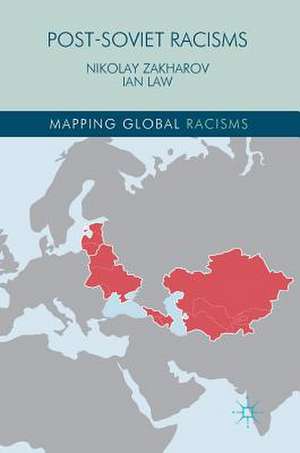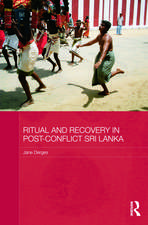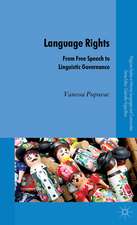Post-Soviet Racisms: Mapping Global Racisms
Autor Nikolay Zakharov, Ian Lawen Limba Engleză Hardback – 21 mar 2017
The book will be of interest to scholars and students in the areas of racism and ethnicity studies.
"What an important and much-needed addition to the growing,but still grossly insufficient, body of work on Soviet racial thinking and its impact on Soviet and post-Soviet racisms. At the time of renewed racial tensions in the West and the growing racial anxieties underlying a variety of nation-building projects in the former Soviet spaces it is important to understand the often ignored linkages between Communist paternalism and Western views of race and racial difference. Even though its focus remains the former Soviet Union this book contains a valuable analytical toolkit for the scholars of race and racism across political and geographical boundaries."-Maxim Matusevich, Seton Hall University, USA"Post-Soviet Racisms is the first comprehensive comparative study of the politics of race in post-Soviet states. Why do racialising or overtly racist theories at times become central to the construction of post-Soviet identities? How do racisms of the dominant national groups and minorities compare? How does the process of the transnational circulation of racist and racialising discourses work? These are some of the important questions which are addressed in this ground-breaking book that enriches our understanding of the complexity of the current developments in the region."
-Vera Tolz, University of Manchester, UK
Preț: 585.73 lei
Preț vechi: 689.09 lei
-15% Nou
Puncte Express: 879
Preț estimativ în valută:
112.07€ • 117.65$ • 93.03£
112.07€ • 117.65$ • 93.03£
Carte tipărită la comandă
Livrare economică 10-24 aprilie
Preluare comenzi: 021 569.72.76
Specificații
ISBN-13: 9781137476913
ISBN-10: 1137476915
Pagini: 192
Ilustrații: XI, 250 p.
Dimensiuni: 148 x 210 x 16 mm
Greutate: 0.47 kg
Ediția:1st ed. 2017
Editura: Palgrave Macmillan UK
Colecția Palgrave Macmillan
Seria Mapping Global Racisms
Locul publicării:London, United Kingdom
ISBN-10: 1137476915
Pagini: 192
Ilustrații: XI, 250 p.
Dimensiuni: 148 x 210 x 16 mm
Greutate: 0.47 kg
Ediția:1st ed. 2017
Editura: Palgrave Macmillan UK
Colecția Palgrave Macmillan
Seria Mapping Global Racisms
Locul publicării:London, United Kingdom
Cuprins
1. The logics and legacy of Soviet racialization.- 2. Racisms in the Baltic states: exclusive nations (with Minna Harjo).- 3. Racialisation in Belarus, Moldova and Ukraine (with Aliaksei Lastouski).- 4. Racisms in the Southern Caucasus: multiple configurations.- 5. Central Asian Racisms (with Maya Shmidt).- 6. Post-Soviet trajectories of race and racism, an end note
Recenzii
“The central aim of the book is to reconfigure race theory at the global level. … The book is addressed to a diverse audience, from academics to general readers seeking to learn about racism beyond the headlines. As part of a broader project, Palgrave Macmillan’s Mapping Global Racisms series, this book gives added value to the systematic study of racism.” (Oxana Karnaukhova, Europe-Asia Studies, Vol. 71 (5), 2019)
Notă biografică
Nikolay Zakharov is Senior Lecturer in the School of Social Sciences, Södertörn University, Sweden.
Ian Law is Professor of Racism and Ethnicity Studies in the School of Sociology and Social Policy, University of Leeds, UK.
Ian Law is Professor of Racism and Ethnicity Studies in the School of Sociology and Social Policy, University of Leeds, UK.
Textul de pe ultima copertă
This book is novel not only in its theoretical framework, which places racialisation in post-communist societies and their modernist political projects at the centre of processes of global racism, but also in being the first account to examine both these new national contexts and the interconnections between racisms in these four regions of the Baltic states, the Southern Caucasus, Central Asia and Belarus, Moldova and Ukraine, and elsewhere. Assessments of the significance of the contemporary geopolitical contexts of armed conflict, economic transformation and political transition for racial discourse are central themes, and the book highlights the creative, innovative and persistent power of contemporary forms of racial governance which has central significance for understanding contemporary societies.
The book will be of interest to scholars and students in the areas of racism and ethnicity studies.
Caracteristici
Brings together work on the critical analysis of racialisation in the Soviet Union and the Russian Federation Applies this new theoretical framework to the process of racialisation Adds a new regional focus to debates on racialisation

































